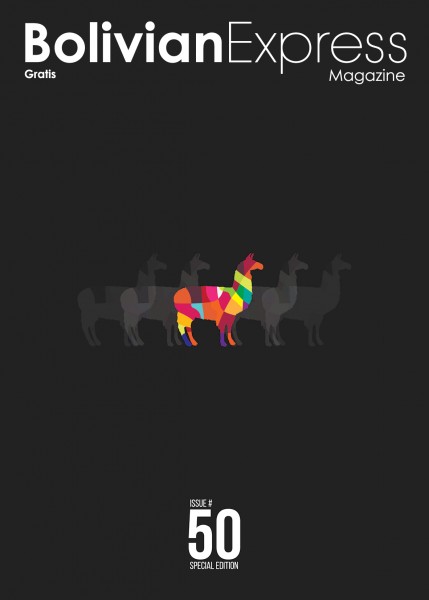
Five years ago Bolivian Express was born between a japanese restaurant and a lift on Avenida 20 de Octubre in La Paz. During the clunky journey from the ground floor to the 17th storey, two young gentlemen and a Swiss-Indian chica lamented the absence of an English-language publication in the country; two notable predecessors—the Bolivian Times and Llama Express—were sadly no longer in circulation. And so the name of the magazine was born as a portmanteau of sorts, an homage to the magazine’s forebearers.
We were determined to find a viable way of printing a quality free publication, given the erratic nature of local advertising revenues and shortage of local English-language journalists. A further (Irish) founder was enlisted and six university friends were boarded on a plane, kidnapped to serve as editorial guinea pigs. It became clear to the founding team that an ideal way of sustaining the project as a whole would be to combine it with a journalism training programme.
What started off as a magazine for tourists quickly turned into something else. After the first 10 issues, we had already covered all the well-trodden festivities and attractions the country is probably best known for. The continuous challenge has been to find new stories from which everyone, including the local audience, can learn something new. Indeed, over half of our readers are native Spanish speakers, so we are as committed to writing for them as we are for the uninitiated in Bolivia. This work has brought us close to people we would perhaps never have had an excuse to get to know: from former presidents, ministers and local sporting heroes, to Michael Jackson impersonators, prisoners serving life sentences and private investigators.
Since our unconventional beginnings, the project has involved over 120 people from 20+ countries worldwide who have come to volunteer as part of the effort.Today, the Bolivian Express team of volunteers live and sleep in a shared house as they explore the country, its stories and cultures with the help of a local team. By looking beyond the salt-flats and ancient ruins, their mission is to bring new eyes to this infinite land. If they leave as cultural ambassadors, rather than just tourists, the project has achieved one of its aims. And, of course, by flicking through these pages you, the reader, are closing the circle and helping to complete this project’s mission.
Over the years we have also worked with a large number of people across the world: editors scattered across San Francisco, New York and Caracas, a web developer in Berlin, an editor and marketing director somewhere in the Swiss alps, and even a virtual assistant in Bulgaria (hey, Pavlin). As past team members have taken on new challenges, others have appeared and have reshaped the project anew. With this, our 50th issue, we are incredibly proud to say that Bolivian Express has a life of its own; it exists as something greater and wiser than the people who have made it possible so far.
Thank you for being a part of this journey.
Here in La Paz, fortune telling is big business. Steeped in the city's history and rich in Aymara culture, this practice is revered by superstitious locals, many of whom would choose a consultation with a Shaman over a trip to the doctor. But to find the spiritual spots frequented by native paceños, you have to look much further than the tourist traps of the Mercado de Brujas.
My desire to take a small glimpse into my future first leads me deep into the depths of El Alto. After a nerve-racking hour of hurtling through the satellite city's narrow streets in a cramped rush-hour minibus, I arrive at my destination.
Sitting a mere 10 meters from the side of a busy road lies a strip of makeshift stalls. A chaotic tapestry of tarpaulin and floral fabric covers this mystical market. Behind the blue plastic entrance of the first stall, I meet a smiling Aymara woman who agrees to read my fortune through the medium of coca leaves. I am surrounded by an atmosphere of unspoken secrets and potential futures that infiltrate the muggy mid-morning air as I sit on a wooden stall in front of my chosen fortune teller. Then, the ritual begins.
Murmuring Aymara mantras, the woman splashes pure alcohol onto the table that separates us, followed by a handful of coca leaves. The fortune teller then asks me what aspect of my future is concerning me most, with another bunch of leaves in her hand. Unsure of whether to fully unleash my quarter-life crisis on this unsuspecting woman, I play it safe with some quintessential twenty-something woes. For each of my questions, a coca leaf is thrown onto the table and its position is carefully studied before my fortune is delivered with great sincerity and solemnity. Half an hour later, I emerge from the tarpaulin shelter 40 bolivianos poorer, but supposedly spiritually richer.
For my next venture into the fortune-telling realm, I find myself a little closer to home. Tucked away in a quiet corner of Sopocachi, lives Doña Juana, a flame-haired Argentinian woman whose gift lies in reading Tarot cards. The air is heavily fragranced with incense and a family of identical Siamese cats slink nonchalantly around the room as my fortune reading is carefully prepared. Two evenly divided stacks of cards sit in front of me. One pile contains cards displaying images of multicoloured crystals and gems. The other, simple designs infused with Christian imagery. My first task is to choose the cards that appeal to me the most, which I take my time in doing, trying not to feel self-conscious about my subconscious.
Examining my chosen cards, Juana begins my reading and leaves no stone unturned. From finance to fertility, the cards seem to be especially talkative today. Throughout this stream of tarot-fuelled inspiration, Juana pauses only to write a mantra for me to alleviate worry and anxiety. Perhaps this is her way of telling me that I'm not French enough to pull off this many existential crises.
'""Kusawa"", that's Aymara for ""like""', Ruben Hilari tells me, as he scrolls down the Facebook homepage excitedly on his phone. Contained in these iPhone pixels is Ruben's latest labour of love, Aymara facebook.
For the past four years, Ruben and his team of linguists and programmers have been translating Facebook into Aymara. Now in its final stages, with around 85% of the site successfully translated, the project will hopefully go public within the next year. As Ruben proudly shows me his Aymaran homepage, it's clear that his dedication and passion is what keeps this project alive.
Since the team was unsuccessful in securing government funding, Ruben and his colleagues are essentially working voluntarily. But perhaps an even greater obstacle to the project’s development is the scarce availability of the internet in Bolivian homes.
'We do most do our work offline', Ruben tells me. 'We download the Spanish words and then sit down together to discuss how to translate them into Aymara.' But how do you go about translating such specific technological vocabulary into a language that has remained relatively unchanged for over 1000 years? With much deliberation. Each word is discussed among the group and a short list of translations is created, from which the final Aymara word is chosen after a round of votes. After hearing all of this, it's not hard to tell why this project has taken four years.
But Ruben’s vision goes far beyond translation. By offering access to Facebook in the Aymara language, Ruben hopes that many more of the 2 million Aymara people in the Andes will establish a social media presence. The idea is that by growing an indigenous online community, Aymara people will begin to present their identities for the world to see.
'Western interpretations of Aymara people always show us to be sad and impoverished,' Ruben tells me, 'as though we are incapable even of smiling. We are always presented as being victims. But with this project we can show that we are complete human beings. We can present how we really are.'
While the project is rooted in technology, its impact will surely be felt far beyond the computer screen. As Ruben's Aymara Facebook approaches completion, social networks can begin to provide a medium for reclaiming indigenous identity.
PHOTO: ALEX AYALA
Strolling down Avenida Ecuador early on a Saturday evening, you may very well be greeted by the sound of a Bach melody floating on the breeze. Following this symphony will lead you through a black metal gate, across a paved garden and into the home of Don Eduardo Machicado Saravia. Stepping across the salon's polished wooden floors and settling down on a plush sofa, you join the enthralled attendees of this intimate listening session. A stained glass window casts a muted glow over the proceedings, while the soft cracking of the fire complements each soaring melody. This Saturday night ritual has a name: las Flaviadas.
The name is derived from the event's founder, Don Flavio Machicado Viscarra, who first had the idea of inviting fellow classical music lovers into his home to share his extensive record collection. Over the years, the Flaviadas has not only attracted a loyal crowd of listeners but a host of international performers and composers, all while maintaining its intimate charm. Now, some seventy years after the dawn of this tradition, music lovers devotedly flock to this cosy haven and let Don Eduardo and his distinguished colleagues (Beethoven and Brahms) transport them to a harmonious realm.

 Download
Download





















